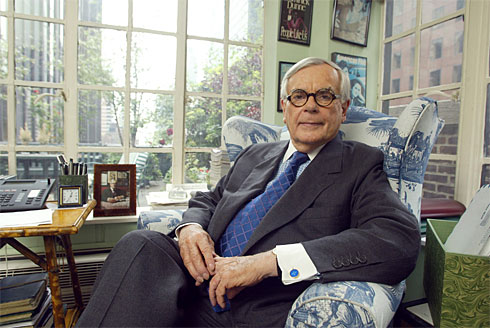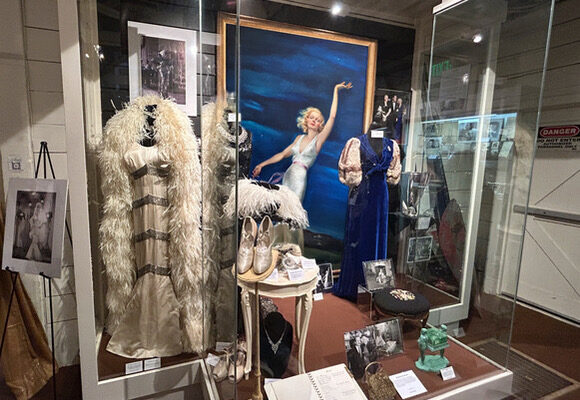By Tony Castro
Columnist, Los Angeles Daily News
DOMINICK DUNNE SURVEYED THE ORNATE, hacienda-style lounge at the legendary Chateau Marmont hotel, knotted his thick gray eyebrows in disapproval and began walking out.
“Let’s talk in my room,” he told a guest who wanted to chat about his coverage of the Phil Spector murder trial for Vanity Fair. “This room always reminds me of Norma Desmond’s living room. You know of Norma Desmond?”
“She killed her writer,” his guest said.

A faint smile crossed Dunne’s face, angular and lined with wisdom and sadness, a combination not unlike his persona, which the Times of London called “patrician enough to mix with high society and low enough to pass on their tittle-tattle.”
But then Hollywood murders — from that of the fictional fading star of “Sunset Boulevard” to the real-life killings like that of actress Lana Clarkson — have been the bete noir for the past quarter century of Dunne’s.
His name has become so synonymous with celebrity crime reporting in America that it popped up in a recent episode of the NBC drama “Law & Order: Criminal Intent.”
In a scene where cops find the body of a famous person who has been killed, one of the detectives in the TV series wise-cracks to another:
“A celebrity murder: Quick, someone call Dominick Dunne.”
But for Dunne, 81, it is a fame he wishes had never come to him, for it is a reward for a career that began 25 years ago with the slaying of his actress-daughter Dominique Dunne, one of the stars of the 1982 film “Poltergeist.”
Dominique Dunne — the niece of novelists John Gregory Dunne and his wife, Joan Didion, and the sister of actor and director Griffin Dunne — was strangled in the driveway of her home by her ex-boyfriend. She was 22.
Her killer, John Thomas Sweeney, a chef at the then-trendy Ma Maison restaurant, was convicted of manslaughter.
“He strangled my daughter for five minutes,” Dunne recalled, “and he got two and a half years. I felt such rage, such absolute rage like I’ve never felt.”
So much rage, in fact, that he says he tried to arrange for a hit man to kill Sweeney.
He turned to private detective Anthony Pellicano, who in the early 1980s was just becoming known for handling celebrity cases but who today is in federal custody on a weapons conviction and under investigation by authorities in a series of Hollywood illegal wiretapping and extortion cases.
“(Pellicano) said to me, `You don’t want to do that, Dominick.’ Just like that, and I’ve never forgotten it,” Dunne said. “I really didn’t want to do it, and I wasn’t asking him to do it. I was there to see if he knew someone who could do it.”
But Pellicano, whose attorney did not return calls for comment for this story, did follow Sweeney on his behalf, Dunne said.
“Afterwards, I said to my two sons, `You know, I don’t want to live this kind of life. There’s something else I can do. I can write about this. I can go on TV. I can talk about it. And I’ve had a whole career that came out of it, or followed it.”
Among the high-profile courtroom dramas Dunne has covered for Vanity Fair have been the trials of the Menendez brothers, Claus von Bulow, Michael Skakel, William Kennedy Smith, O.J. Simpson and Robert Blake.
Along the way, he also has written a series of books on the trials. He has become a frequent guest on television shows and has had his own series on CourtTV called “Dominick Dunne’s Power, Privilege, and Justice.”
“Dominick is wonderful and he’s a dear friend,” said Associated Press reporter Linda Deutsch, the doyenne of the criminal courts press corps, who has covered many of those celebrity trials with Dunne.
“It’s amazing to people that we’re close friends because we approach covering the trials from such different places.”
While Deutsch said she has to maintain her objectivity as a reporter, Dunne comes at it as a victim’s advocate and “can be very outraged and outspoken about what he sees as injustices in the system.”
So widespread is Dunne’s connection to celebrity trials that this season he was cast to play himself in two episodes of TNT’s police drama “The Closer.”
For the past five months, he has been ensconced in the same suite of the Chateau Marmont that he has occupied while covering previous celebrity trials, the walls covered with notes, faxes and other material related to the Spector case.
His reporting on the trial, like his writing on other cases, has been packed with exclusive anecdotes and details that often have the regular press corps trailing him.
“I’m not the typical reporter who just stands back and reports,” he said. “I get emotionally involved, and I am emotionally involved with Lana Clarkson because that’s what happened to my daughter.”
Dunne did not start writing until he was in his 50s. After a career as a studio executive, he began writing novels, garnering success with his second fictional effort “The Two Mrs. Grenvilles,” a best-seller that became an NBC movie, as did the novel “An Inconvenient Woman.”
In recent weeks, Dunne has been the subject of an Australian television documentary on his life in Hollywood, his reporting on celebrity crime and as the father of a victim.
“I’ve covered some of the most high-profile trials in the country,” he said, “and I love doing it.”
He paused, then, almost as if relieved:
“But this, I think, is my last trial. I started with a Hollywood trial and I’ll end with a Hollywood trial.”
This story appeared in the Los Angeles Daily News on August 27, 2007. It is republished here by permission.





